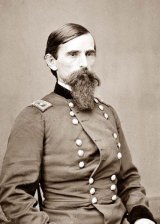Ben-Hur Page #12
Ben-Hur: A Tale of the Christ is a novel by Lew Wallace, published by Harper and Brothers on November 12, 1880, and considered "the most influential Christian book of the nineteenth century". It became a best-selling American novel, surpassing Harriet Beecher Stowe's Uncle Tom's Cabin in sales.
"Well, they are dead now," the Nazarene proceeded. "They died in Nazareth. Joachim was not rich, yet he left a house and garden to be divided between his daughters Marian and Mary. This is one of them; and to save her portion of the property, the law required her to marry her next of kin. She is now my wife." "And you were--" "Her uncle." "Yes, yes! And as you were both born in Bethlehem, the Roman compels you to take her there with you to be also counted." The Rabbi clasped his hands, and looked indignantly to heaven, exclaiming, "The God of Israel still lives! The vengeance is his!" With that he turned and abruptly departed. A stranger near by, observing Joseph's amazement, said, quietly, "Rabbi Samuel is a zealot. Judas himself is not more fierce." Joseph, not wishing to talk with the man, appeared not to hear, and busied himself gathering in a little heap the grass which the donkey had tossed abroad; after which he leaned upon his staff again, and waited. In another hour the party passed out the gate, and, turning to the left, took the road into Bethlehem. The descent into the valley of Hinnom was quite broken, garnished here and there with straggling wild olive-trees. Carefully, tenderly, the Nazarene walked by the woman's side, leading-strap in hand. On their left, reaching to the south and east round Mount Zion, rose the city wall, and on their right the steep prominences which form the western boundary of the valley. Slowly they passed the Lower Pool of Gihon, out of which the sun was fast driving the lessening shadow of the royal hill; slowly they proceeded, keeping parallel with the aqueduct from the Pools of Solomon, until near the site of the country-house on what is now called the Hill of Evil Counsel; there they began to ascend to the plain of Rephaim. The sun streamed garishly over the stony face of the famous locality, and under its influence Mary, the daughter of Joachim, dropped the wimple entirely, and bared her head. Joseph told the story of the Philistines surprised in their camp there by David. He was tedious in the narrative, speaking with the solemn countenance and lifeless manner of a dull man. She did not always hear him. Wherever on the land men go, and on the sea ships, the face and figure of the Jew are familiar. The physical type of the race has always been the same; yet there have been some individual variations. "Now he was ruddy, and withal of a beautiful countenance, and goodly to look to." Such was the son of Jesse when brought before Samuel. The fancies of men have been ever since ruled by the description. Poetic license has extended the peculiarities of the ancestor to his notable descendants. So all our ideal Solomons have fair faces, and hair and beard chestnut in the shade, and of the tint of gold in the sun. Such, we are also made believe, were the locks of Absalom the beloved. And, in the absence of authentic history, tradition has dealt no less lovingly by her whom we are now following down to the native city of the ruddy king. She was not more than fifteen. Her form, voice, and manner belonged to the period of transition from girlhood. Her face was perfectly oval, her complexion more pale than fair. The nose was faultless; the lips, slightly parted, were full and ripe, giving to the lines of the mouth warmth, tenderness, and trust; the eyes were blue and large, and shaded by drooping lids and long lashes; and, in harmony with all, a flood of golden hair, in the style permitted to Jewish brides, fell unconfined down her back to the pillion on which she sat. The throat and neck had the downy softness sometimes seen which leaves the artist in doubt whether it is an effect of contour or color. To these charms of feature and person were added others more indefinable--an air of purity which only the soul can impart, and of abstraction natural to such as think much of things impalpable. Often, with trembling lips, she raised her eyes to heaven, itself not more deeply blue; often she crossed her hands upon her breast, as in adoration and prayer; often she raised her head like one listening eagerly for a calling voice. Now and then, midst his slow utterances, Joseph turned to look at her, and, catching the expression kindling her face as with light, forgot his theme, and with bowed head, wondering, plodded on. So they skirted the great plain, and at length reached the elevation Mar Elias; from which, across a valley, they beheld Bethlehem, the old, old House of Bread, its white walls crowning a ridge, and shining above the brown scumbling of leafless orchards. They paused there, and rested, while Joseph pointed out the places of sacred renown; then they went down into the valley to the well which was the scene of one of the marvellous exploits of David's strong men. The narrow space was crowded with people and animals. A fear came upon Joseph--a fear lest, if the town were so thronged, there might not be house-room for the gentle Mary. Without delay, he hurried on, past the pillar of stone marking the tomb of Rachel, up the gardened slope, saluting none of the many persons he met on the way, until he stopped before the portal of the khan that then stood outside the village gates, near a junction of roads. CHAPTER IX To understand thoroughly what happened to the Nazarene at the khan, the reader must be reminded that Eastern inns were different from the inns of the Western world. They were called khans, from the Persian, and, in simplest form, were fenced enclosures, without house or shed, often without a gate or entrance. Their sites were chosen with reference to shade, defence, or water. Such were the inns that sheltered Jacob when he went to seek a wife in Padan-Aram. Their like may been seen at this day in the stopping-places of the desert. On the other hand, some of them, especially those on the roads between great cities, like Jerusalem and Alexandria, were princely establishments, monuments to the piety of the kings who built them. In ordinary, however, they were no more than the house or possession of a sheik, in which, as in headquarters, he swayed his tribe. Lodging the traveller was the least of their uses; they were markets, factories, forts; places of assemblage and residence for merchants and artisans quite as much as places of shelter for belated and wandering wayfarers. Within their walls, all the year round, occurred the multiplied daily transactions of a town. The singular management of these hostelries was the feature likely to strike a Western mind with most force. There was no host or hostess; no clerk, cook, or kitchen; a steward at the gate was all the assertion of government or proprietorship anywhere visible. Strangers arriving stayed at will without rendering account. A consequence of the system was that whoever came had to bring his food and culinary outfit with him, or buy them of dealers in the khan. The same rule held good as to his bed and bedding, and
Translation
Translate and read this book in other languages:
Select another language:
- - Select -
- 简体中文 (Chinese - Simplified)
- 繁體中文 (Chinese - Traditional)
- Español (Spanish)
- Esperanto (Esperanto)
- 日本語 (Japanese)
- Português (Portuguese)
- Deutsch (German)
- العربية (Arabic)
- Français (French)
- Русский (Russian)
- ಕನ್ನಡ (Kannada)
- 한국어 (Korean)
- עברית (Hebrew)
- Gaeilge (Irish)
- Українська (Ukrainian)
- اردو (Urdu)
- Magyar (Hungarian)
- मानक हिन्दी (Hindi)
- Indonesia (Indonesian)
- Italiano (Italian)
- தமிழ் (Tamil)
- Türkçe (Turkish)
- తెలుగు (Telugu)
- ภาษาไทย (Thai)
- Tiếng Việt (Vietnamese)
- Čeština (Czech)
- Polski (Polish)
- Bahasa Indonesia (Indonesian)
- Românește (Romanian)
- Nederlands (Dutch)
- Ελληνικά (Greek)
- Latinum (Latin)
- Svenska (Swedish)
- Dansk (Danish)
- Suomi (Finnish)
- فارسی (Persian)
- ייִדיש (Yiddish)
- հայերեն (Armenian)
- Norsk (Norwegian)
- English (English)
Citation
Use the citation below to add this book to your bibliography:
Style:MLAChicagoAPA
"Ben-Hur Books." Literature.com. STANDS4 LLC, 2024. Web. 25 Nov. 2024. <https://www.literature.com/book/ben-hur_1675>.




Discuss this Ben-Hur book with the community:
Report Comment
We're doing our best to make sure our content is useful, accurate and safe.
If by any chance you spot an inappropriate comment while navigating through our website please use this form to let us know, and we'll take care of it shortly.
Attachment
You need to be logged in to favorite.
Log In